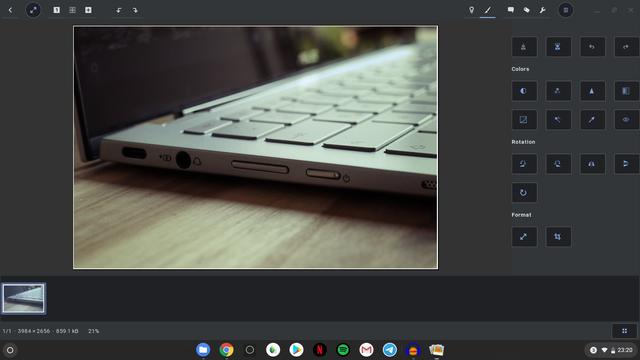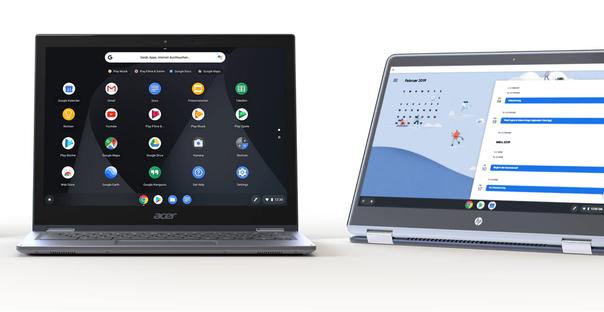Google's Chrome OS is now over 10 years old and has become something of an open platform over time. There are few native apps for the notebook operating system, which is why Google happily allows other apps to run on the system. According to the latest reports, Windows apps will also be included from autumn.
Chrome OS Vice President John Solomon announces this on the Google Cloud Blog; Parallels confirms the collaboration. Windows apps would come via the Parallels virtualization solution on Chrome OS, which then runs natively on Google's cloud system. The use of Windows apps on Chrome OS was previously possible via the Parallels Remote Application Server, but was far less convenient than virtualization.
After Android and Linux now also Windows apps
Both companies have already confirmed the porting of Microsoft Office to Chrome OS. In principle, however, any other Windows apps are also possible via an executable virtualization. To what extent Parallels supports this, the two companies are not yet revealing. And what Microsoft actually thinks of it is not yet known.
At the latest with the integration of Windows apps via Parallels, a cross-platform strategy of Chrome OS can no longer be denied. After Google initially approved Android apps via the Play Store on Chrome OS in 2016, thereby uniting both systems to some extent, support for Linux apps was added a good year ago.
Their installation is currently left to the users. You need to enable Linux virtualization first, then install apps manually using the terminal; a graphical user interface or an app store are missing. In my test with the Asus Chromebook Flip C436, however, this worked surprisingly well for most Linux apps. They had access to the file system, could be opened and closed like Android apps and pinned to the app bar like normal apps.
Chromebooks: Interesting with faster core processors
The fact that there was hardly any difference here is also due to the machinery of the Asus Chromebook Flip C436. With an Intel Core i5 of the 10th generation and 16 GB of RAM, the notebook is more likely to be assigned to the professional class. The virtualization of Linux apps is likely to run much more slowly on the other entry-level computers, which are mostly Chromebooks.
It's nice that Google is giving users of their Chromebooks better and better app options. Imagine that apps like Adobe Photoshop or PC games could soon be virtualized on a Chromebook. Google's notebooks would be a lot more attractive.
They are becoming more popular with users anyway - also "thanks" to the Corona crisis and the associated trend towards working from home. In his blog post, Solomon reports that Chromebook sales in the USA have increased significantly. Up 109 percent year-on-year and up 155 percent in Q1 2020 compared to Q1 2019.
Google could do more
In my opinion, however, Google still fails to recognize the greatest potential of Chrome OS. And that is simply the quality of Android apps that have been running on more modern Chromebooks since 2016. There have long been apps like Photoshop Express and MS Word for Chromebooks. They are Android apps that have a significantly smaller range of functions than their namesakes on Windows.

And they're clearly not optimized for notebooks. Think of confirmation buttons like "Click here" that span the entire width of the screen on the smartphone. On the much larger Chromebook screen, they do too; the design is completely misshapen. And very often, advertising banners flash in apps because that's a good source of income for the developers of Play Store apps. They look completely out of place on more serious-looking desktop computers.
Google really doesn't need to do more than make the possibility of Chromebooks more palatable to Android app developers. And be it with a collection of specially supported exclusive apps. A few more steps and a developer conjures up a notebook app from a smartphone app. Not much is needed, but for Google this possibility is a blind spot.
Be that as it may: Chromebooks are becoming more popular, they are becoming more technically efficient and also more and more interesting for private customers. On the way to number 3 behind Windows and macOS, they even have a good chance of leaving prominent Linux distributions such as Ubuntu or Mint behind. It would be great for users to have more powerful Windows alternatives. Even if Chrome OS is still a few percentage points behind Windows and macOS in terms of user-friendliness.
Please leave this field empty
Subscribe to new posts!
Fresh every day at 5 p.m. in the mailbox
Topic selection
All themes
PC & Notebook
Changes are possible at any time via subscription management - other topics available
Declaration of Consent *
I consent to EURONICS Deutschland eG, Ditzingen, informing me via e-mail about news on the topics I have selected above. I can revoke my consent at any time by sending an email to info@euronics.de.
You can find further information on the use of your data for advertising purposes in our data protection declaration.
Check your inbox or spam folder to confirm your subscription.
Comment now!



